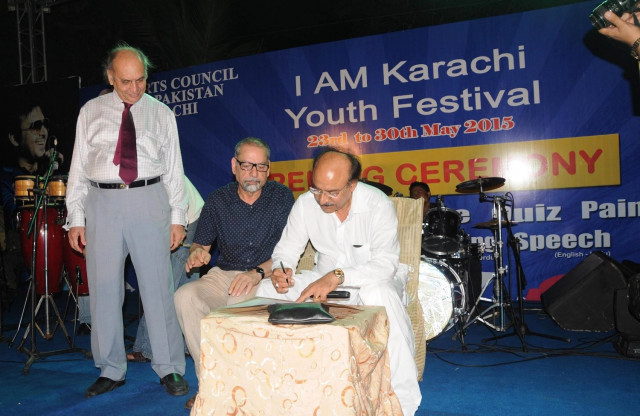Promoting aesthetics: Arts to be made compulsory at schools in Sindh
Education dept and Arts Council sign MoU to make the arts mandatory for secondary classes

Education department and Arts Council sign MoU to make the arts mandatory for secondary classes. PHOTO: MOHAMMAD NOMAN/EXPRESS
Education minister Nisar Ahmed Khuhro announced this on Saturday. A memorandum of understanding (MoU) was signed by the provincial education and literacy department and the Arts Council of Pakistan, Karachi, to make fine arts and performing arts compulsory from class six to class eight. Khuhro signed the agreement with Arts Council secretary Muhammad Ahmed Shah.

Reminiscing about the first time he came to Karachi in 1968 and travelled in a tram, Khuhro talked about how he enjoyed Ahmed's sohan halwa and to Ahmed Rushdi's song, 'Bander road se Keamari', during the journey. "The city had lost its charm but the energy I see in today's youth is a sign that we will bring those days back," he said. According to Khuhro, the MoU is a step towards promoting the acceptability of performing arts. "The education and literacy department will start the subjects of fine arts and performing arts from class six up to the secondary level," said Khuhro.
'I Am Karachi' Youth Festival
Meanwhile, Khuhro also inaugurated the 'I Am Karachi' Youth Festival — II and visited the painting and photography competitions at the Manzar Akbar Hall and Gulrang Hall at Arts Council. "One should make efforts in those sectors where we are weak," said Khuhro, congratulating the youth on their hard work in bringing back the lights of Karachi. "If we are lacking in something, we should admit it and work on it."
Speaking about the introduction of fine arts and performing arts as compulsory for classes six to eight, he said, "Instead of promoting the Kalashnikov culture, we believe in educating our children and engaging them in cultural activities." Fine arts and performing arts classes will comprise theatre, music, dance, painting, photography and a lot more, said the minister, addressing the youth from areas as varied as Gadap Town, Surjani Town, Korangi and Orangi Town. "This will enhance the capabilities of students and enrich the generation that has been deprived [of opportunities] due to a lack of strong education system, dual educational policies in the province and limited resources," he said.
Speaking on the occasion, the Arts Council secretary said that the MoU also aims to utilise the expertise and experience of the Arts Council in promoting and managing arts and culture. "We are here to encourage the younger generation," said Shah. "We also provide training opportunities for students and art education for their cultural and artistic development." He stressed that the Arts Council and the Sindh government cannot do anything alone. "We need teachers to be appointed for teaching music and other arts in schools," he said, shedding light on how this step will increase vacancies in Sindh and will also promote performing arts. Students can learn what they want and become experts in the fields that interest them.
Published in The Express Tribune, May 25th, 2015.



















COMMENTS
Comments are moderated and generally will be posted if they are on-topic and not abusive.
For more information, please see our Comments FAQ